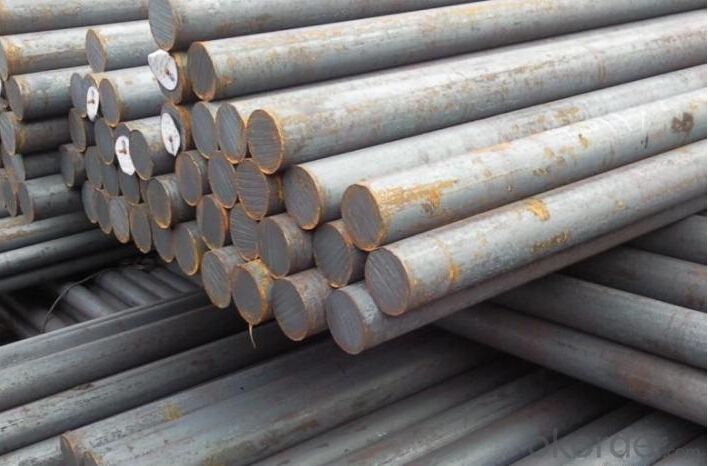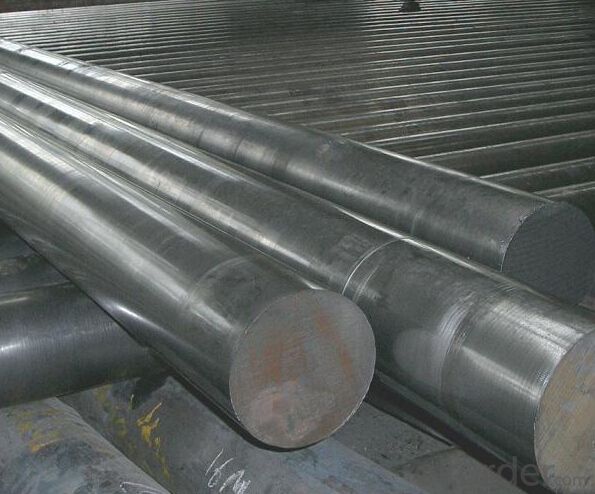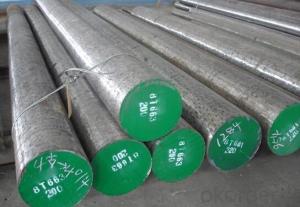Grade SAE 5140 alloy steel round bars Hot Rolled
- Loading Port:
- Tianjin
- Payment Terms:
- TT OR LC
- Min Order Qty:
- 3 m.t.
- Supply Capability:
- 10000 m.t./month
OKorder Service Pledge
OKorder Financial Service
You Might Also Like
Item specifice
Product Description:
OKorder is offering Grade 5140 alloy steel round bar at great prices with worldwide shipping. Our supplier is a quality manufacturer of steel, with our products utilized the world over. OKorder annually supplies products to European, North American,African and Asian markets..etd. We will quote you our most competitive prices within 24 hours after received the inquiry and guarantee the quality.
Product Applications:
Grade SAE51200/ GCr15 / 100cr6 Bearing Steel are ideal for structural applications and are widely used in the
Gear, Sleevesspool,Shaft, Crankshaft, Pin
Product Advantages:
OKorder's Grade SAE5140 alloy steel are durable, strong, and resist corrosion.
Chemical Composition
Grade | C | Si | Mn | Cr | Ni | Cu | P | S |
40Cr | 0.37-0.44 | 0.17-0.37 | 0.50-0.80 | 0.80-1.10 | ≤0.30 | ≤0030 | ≤0.035 | ≤0.035 |
41Cr4 | 0.38-0.45 | ≤0.40 | 0.60-0.90 | 0.90-1.20 | ≤0.030 | ≤0.030 | ≤0.035 | ≤0.035 |
5140 | 0.38-0.43 | 0.17-0.37 | 0.70-0.90 | 0.70-0.90 | ≤0.030 | ≤0.030 | ≤0.040 | ≤0.035 |
Mechanical Properties
Grade | Tensile Strengthσb (MPa) | Yield Strength | Elongation | Reduction of Area ψ (%) | Impact Akv(J) | Hardness |
|
| |||||
σs (MPa) | δ5 (%) | |||||
5140 | ≥980(100) | ≥785(80) | ≥9 | ≥45 | ≥47 | ≤207HB |
Packaging & Delivery
Standard seaworthy packing or as customer required
Leadtime
Delivery time: Within 30 days after order is confirmed.


- Q:Can special steel be used in the furniture manufacturing industry?
- Yes, special steel can be used in the furniture manufacturing industry. It provides strength, durability, and flexibility, making it suitable for various furniture components such as frames, legs, and hardware. Special steel alloys can also offer unique aesthetics and design possibilities, contributing to the overall quality and appeal of furniture products.
- Q:Can special steel be used in the production of fasteners?
- Yes, special steel can be used in the production of fasteners. Special steel, such as stainless steel or alloy steel, offers enhanced strength, corrosion resistance, and durability, making it suitable for various fastening applications in industries like automotive, aerospace, and construction.
- Q:What are the limitations of using special steel in high-stress applications?
- There are several limitations to using special steel in high-stress applications. Firstly, special steel can be quite expensive compared to other materials. This can make it less feasible for certain projects or industries with budget constraints. Secondly, special steel may not always be readily available or easily sourced. This can lead to delays in production or construction timelines, which can be problematic in high-stress applications where time is of the essence. Additionally, special steel may have limitations in terms of its structural integrity. While it is generally stronger and more resistant to wear and tear compared to regular steel, it may still have certain limits in terms of load-bearing capacity. This means that in extremely high-stress applications, special steel may not be the most suitable choice. Moreover, special steel can be more difficult to work with compared to other materials. It may require specialized equipment or techniques for cutting, welding, or shaping, which can add complexity and cost to the manufacturing process. Lastly, special steel may have limitations in terms of its corrosion resistance. While it is generally more resistant to corrosion compared to regular steel, it may still be prone to rust or degradation if not properly maintained or exposed to harsh environments. This can be a concern in high-stress applications where the durability and longevity of the material are crucial. Overall, while special steel offers many benefits in high-stress applications, it is important to consider its limitations in terms of cost, availability, load-bearing capacity, workability, and corrosion resistance. These factors should be carefully evaluated to determine the most suitable material for a specific high-stress application.
- Q:What are the main characteristics of tool steel?
- Tool steel is a type of steel that is specifically designed for the production of tools, such as drills, dies, and cutting instruments. It possesses several key characteristics that make it suitable for these applications. Firstly, tool steel is known for its exceptional hardness. It has a high carbon content, typically ranging from 0.5% to 1.5%, which contributes to its hardness. This hardness allows tool steel to resist wear and abrasion, making it ideal for cutting and shaping materials. Another important characteristic of tool steel is its high toughness. Tool steel is able to withstand high impact and shock loads without fracturing or breaking. This toughness is crucial in tooling applications where tools are subjected to heavy loads and forces. Tool steel also exhibits excellent heat resistance. It has a high melting point, allowing it to maintain its strength and hardness even at elevated temperatures. This heat resistance is crucial in applications where tools are exposed to high temperatures during cutting or shaping processes. In addition to these characteristics, tool steel possesses good dimensional stability and machinability. It has low distortion and shrinkage during heat treatment, ensuring that the tool maintains its shape and size. Tool steel is also easily machinable, allowing for the production of intricate shapes and designs. Overall, the main characteristics of tool steel include high hardness, toughness, heat resistance, dimensional stability, and machinability. These properties make tool steel an ideal material for the production of tools that require high strength, durability, and performance.
- Q:What are the specific requirements for special steel used in the power transmission industry?
- The specific requirements for special steel used in the power transmission industry are related to its durability, strength, and resistance to various environmental factors. These requirements are crucial as power transmission equipment operates under high loads, extreme temperatures, and corrosive conditions. Here are some specific requirements for special steel in the power transmission industry: 1. High Strength: Special steel used in power transmission must possess high strength to withstand the mechanical stresses and loads imposed by the power transmission equipment. This ensures that the steel can effectively carry the weight and resist deformation or failure. 2. Hardness: Special steel needs to have sufficient hardness to resist wear and abrasion. Power transmission equipment often involves moving parts that experience constant friction and contact, so the steel must be able to withstand these forces without wearing down quickly. 3. Corrosion Resistance: The steel used in power transmission should have excellent resistance to corrosion and rusting. Power transmission equipment is frequently exposed to moisture, chemicals, and other corrosive substances, so the steel must be able to withstand these conditions without deteriorating or losing its structural integrity. 4. Heat Resistance: Power transmission equipment operates at high temperatures, especially in cases of power generation and distribution. Therefore, special steel used in this industry must possess high heat resistance to prevent deformation, loss of strength, or failure under extreme thermal conditions. 5. Electrical Conductivity: Some power transmission components require steel with good electrical conductivity to ensure efficient transmission of electricity. Steel used for conductive purposes must have low resistance to electrical flow, allowing for minimal power loss during transmission. 6. Fatigue Resistance: Special steel used in the power transmission industry should have excellent fatigue resistance properties. This means that the steel can withstand repeated cycles of stress and strain without cracking or breaking, thereby ensuring its long-term reliability and durability. 7. Dimensional Stability: The steel used in power transmission must maintain its dimensional stability over time. This ensures that the equipment maintains its intended design and functionality, even under different operating conditions. In conclusion, the specific requirements for special steel used in the power transmission industry include high strength, hardness, corrosion resistance, heat resistance, electrical conductivity, fatigue resistance, and dimensional stability. These requirements ensure that the steel can withstand the demanding operational conditions and provide reliable and efficient power transmission.
- Q:How is special steel used in the construction of buildings and bridges?
- Special steel is commonly used in the construction of buildings and bridges due to its high strength and durability. It is used in various structural components such as beams, columns, and reinforcement bars, where its exceptional strength-to-weight ratio allows for the creation of lighter and more efficient structures. Additionally, special steel's resistance to corrosion and extreme weather conditions makes it a suitable choice for projects in harsh environments. Overall, special steel enhances the structural integrity and longevity of buildings and bridges, ensuring their safety and reliability.
- Q:What are the specific requirements for special steel used in the mining drill bit industry?
- The specific requirements for special steel used in the mining drill bit industry include high strength and hardness to withstand the extreme conditions of drilling, excellent wear resistance to withstand abrasion from rocks and minerals, good toughness to resist breakage and cracking, and high heat resistance to withstand the heat generated during drilling. Additionally, the steel should have good machinability to facilitate the manufacturing process of the drill bits.
- Q:What are the main advantages of using special steel in the automotive racing industry?
- The main advantages of using special steel in the automotive racing industry are its high strength-to-weight ratio, excellent durability, and superior heat resistance. Special steel allows for the construction of lightweight yet strong components, enhancing the overall performance and speed of racing cars. Additionally, its exceptional durability ensures that the parts can withstand the extreme forces and vibrations experienced during racing, minimizing the risk of failure. Moreover, special steel's excellent heat resistance prevents deformation or weakening of components, even under high temperatures generated by the intense racing conditions.
- Q:Can special steel be used in the aerospace defense industry?
- Yes, special steel can be used in the aerospace defense industry. Special steel alloys, such as titanium, stainless steel, and nickel-based alloys, are commonly used in aerospace applications due to their exceptional strength, corrosion resistance, and high-temperature capabilities. These materials are often employed in manufacturing aircraft components, rocket engines, missile systems, and other defense-related structures to ensure superior performance and durability in extreme conditions.
- Q:How does special steel contribute to the manufacturing of valves and pumps?
- Special steel plays a crucial role in the manufacturing of valves and pumps. Its exceptional properties such as high strength, corrosion resistance, and heat resistance make it an ideal material choice. Special steel ensures the durability and reliability of valves and pumps, enabling them to withstand harsh conditions, high pressure, and extreme temperatures. Additionally, the precise composition and mechanical properties of special steel allow for efficient fluid flow control and efficient energy transfer in valves and pumps, enhancing their overall performance.
1. Manufacturer Overview |
|
|---|---|
| Location | |
| Year Established | |
| Annual Output Value | |
| Main Markets | |
| Company Certifications | |
2. Manufacturer Certificates |
|
|---|---|
| a) Certification Name | |
| Range | |
| Reference | |
| Validity Period | |
3. Manufacturer Capability |
|
|---|---|
| a)Trade Capacity | |
| Nearest Port | |
| Export Percentage | |
| No.of Employees in Trade Department | |
| Language Spoken: | |
| b)Factory Information | |
| Factory Size: | |
| No. of Production Lines | |
| Contract Manufacturing | |
| Product Price Range | |
Send your message to us
Grade SAE 5140 alloy steel round bars Hot Rolled
- Loading Port:
- Tianjin
- Payment Terms:
- TT OR LC
- Min Order Qty:
- 3 m.t.
- Supply Capability:
- 10000 m.t./month
OKorder Service Pledge
OKorder Financial Service
Similar products
New products
Hot products
Related keywords





























